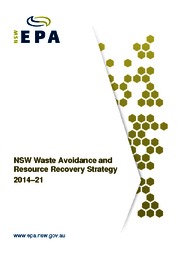The NSW Waste and Resource Recovery Strategy 2014-21 (PDF 549KB) was released in December 2014.
It sets clear directions for a range of priority areas over the next seven years and aligns with the NSW Government’s waste reforms in NSW 2021: A plan to make NSW number one.
The key areas identified in the strategy will support investment in much-needed infrastructure, encourage innovation and improve recycling behaviour. They will also help develop new markets for recycled materials and reduce litter and illegal dumping.
2014-2021 WARR Strategy targets
The strategy sets the following targets for 2021–22
- avoiding and reducing the amount of waste generated per person in NSW
- increasing recycling rates to
- 70% for municipal solid waste
- 70% for commercial and industrial waste
- 80% for construction and demolition waste
- increasing waste diverted from landfill to 75%
- managing problem wastes better, establishing 86 drop-off facilities and services across NSW
- reducing litter, with 40% fewer items (compared to 2012) by 2017
- combatting illegal dumping, with 30% fewer incidents (compared to 2011) by 2017.
The new strategy provides a clear framework for waste management to 2021-22 and provides an opportunity for NSW to continue to increase recycling across all waste streams.
Programs and policies related to the WARR Strategy
The WARR Strategy is supported by Waste Less, Recycle More, a NSW Government initiative funded by the waste levy, providing $465.7 million for waste and recycling improvements across NSW.
The WARR Strategy also sets the direction for other related programs, policies and plans that work to minimise the impact of waste on the environment and human health, including
- education to encourage behaviour change
- economic mechanisms like the waste levy that encourage resource recovery over landfill disposal
- enforcement of the waste regulations
- incentives to encourage investment, innovation and improvement in environmental practices.
WARR Strategy progress reports
The EPA is required to report progress against the WARR strategy every two years.
See Waste publications and reports for local councils for a complete list of these reports.


